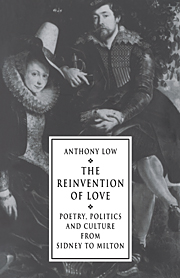Book contents
- Frontmatter
- Contents
- Preface
- Introduction
- 1 Sir Philip Sidney: “huge desyre”
- 2 John Donne: “Defects of lonelinesse”
- 3 John Donne: “the Holy Ghost is amorous in his Metaphors”
- 4 George Herbert: “the best love”
- 5 Richard Crashaw: “love's delicious Fire”
- 6 Thomas Carew: “fresh invention”
- 7 John Milton: “Because wee freely love”
- 8 John Milton: “Haile wedded Love”
- Conclusion
- Notes
- Index
2 - John Donne: “Defects of lonelinesse”
Published online by Cambridge University Press: 02 October 2009
- Frontmatter
- Contents
- Preface
- Introduction
- 1 Sir Philip Sidney: “huge desyre”
- 2 John Donne: “Defects of lonelinesse”
- 3 John Donne: “the Holy Ghost is amorous in his Metaphors”
- 4 George Herbert: “the best love”
- 5 Richard Crashaw: “love's delicious Fire”
- 6 Thomas Carew: “fresh invention”
- 7 John Milton: “Because wee freely love”
- 8 John Milton: “Haile wedded Love”
- Conclusion
- Notes
- Index
Summary
The line of aristocratic love poetry from Wyatt and Surrey to Ralegh and Sidney reveals most clearly how Petrarchan love came to its unsustainable climax and inevitable breakdown in high Renaissance England, as it first merged with courtly ideals and internalized them, and then proved incapable of satisfying the intense desires that were unleashed by this combination of poetic traditions at just the moment that the broader culture was moving away from the feudal vision of worth and nobility. On the periphery of this courtly crisis in love poetry were such sonneteers as Daniel and Drayton, who, as paid observers of the aristocratic scene and as mediators between the court and the book-buying public, had less at stake personally, though more financially. Such semi-professional poets, often admirably competent, sometimes brilliant, could continue to work the old modes as long as there was a continuing demand for them among interested patrons or among book-buyers who coveted inside knowledge of how aristocrats should love.
As I have suggested in the introduction, beginning with Shakespeare and Spenser a new kind of lover appears on the scene. Instead of courting endlessly and vainly in the Petrarchan manner, the new lovers will marry and live happily ever afterward – if they can ever straighten out their psychological problems, overcome the usual familial and social impediments, and discern and follow the true, virtuous path.
- Type
- Chapter
- Information
- The Reinvention of LovePoetry, Politics and Culture from Sidney to Milton, pp. 31 - 64Publisher: Cambridge University PressPrint publication year: 1993



